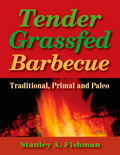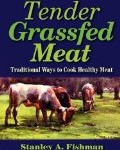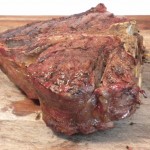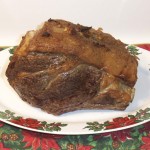Real Food, Wise and Robust Old Age
By Stanley A. Fishman, author of Tender Grassfed Meat

 photo credit: conner395. Inverness Castle in the Scottish Highlands, home of a healthy people.
photo credit: conner395. Inverness Castle in the Scottish Highlands, home of a healthy people.
Old people in modern times are considered weak, foolish, and helpless, unable to survive without care. Most people expect to be weak and helpless when they get old, and to end their lives in a “rest home.†We often read in the news media that young workers will have the burden of taking care of an aging population.
Yet this is a new and horrible way of aging. Through most of history, old age was associated with wisdom, strength, and leadership. Most older people who ate a traditional diet not only took care of themselves, but led their communities, taught the young, and were the repository of knowledge and leadership for their peoples.
What is the difference? Why did old age change from a time of wisdom and leadership to a time of failing minds, deteriorating bodies, and chronic illness?
What we do know is that people eating the healthy traditional diets of their ancestors, with little or no medical care, remained wise and strong into their nineties.
We also know that modern people eating the Standard American Diet (SAD) become helpless in their sixties and seventies and even younger, unable to care for themselves, needing all kinds of expensive medical care and procedures just to keep breathing.
In other words, real food is the key to a wise and healthy old age.
Traditional Old Age
Throughout most of history, old age was associated with strength and wisdom.
Age was considered a prerequisite for leadership, and younger leaders always had older advisors. Every village, from England to Africa to the Americas to Russia to India to China, and almost everywhere else, depended on a council of elders, who would make decisions for the whole village, based on their experience and knowledge. It was accepted that these old people were the only ones who had the knowledge and experience to make important decisions. The knowledge of childbirth, cooking, what was safe to eat, and healing was usually taught and administered by the older women, who were universally respected.
On a national level, many traditional societies had councils of elders who would make decisions for the whole nation or tribe.
It should be understood that old people eating traditional diets were not only much wiser, but much healthier physically. History has thousands of examples of people who were “old†but showed great physical prowess. A few examples:
Gebhard Von Blucher
He was a nobleman, growing up on the finest food his culture could provide, eating huge amounts of wild game and grassfed meat.
He commanded the Prussian Army at the battles of Ligny and Waterloo, in 1815. Blucher was 73 at the time. During the battle of Ligny, Blucher led a cavalry charge against the French. His horse was shot, throwing Blucher to the ground. The horse then fell on Blucher, pinning him to the ground. The opposing cavalry forces charged several times over the area, back and forth, which resulted in Blucher being repeatedly trampled by horses, sustaining many wounds from their hoofs. After the battle, the horse was pulled off Blucher. Blucher poured brandy on his many wounds and drank some, and recovered in a few hours. He reorganized his defeated army and led them to Waterloo, a couple days later, where the sudden appearance of his army on the French flank helped the Allies win the battle.
Malcolm Macpherson
He was a Highlander, growing up on a traditional diet that had not changed for thousands of years. At age 57, he took part in the rebellion of Bonnie Prince Charlie, and fought in the battle of Culloden in 1745, wielding a heavy broadsword. Macpherson blamed the French for the Highland defeat. When Britain went to war against France some years later, Macpherson joined a Highland regiment at age 70. He fought the French in North America, using his heavy broadsword so effectively in hand-to-hand combat that he was taken to England to meet the king.
It should be understood that the above examples of robust old people were not unusual, and old people were expected to carry their weight and take part fully in all the activities of life, no matter how difficult.
Dr. Weston A. Price studied healthy peoples eating the diets of their ancestors. The elders of these people kept their teeth and their eyesight, leading active productive lives without illness or doctors. They did not live in fear of chronic diseases like cancer and heart disease—these illnesses did not exist in their societies.
In fact, studies of the healthy peoples eating traditional diets have repeatedly found that most people remain healthy and productive into their nineties or even longer. They will usually slow down at some point, where they become consistently less active for a period of several months, then die in their sleep.
These healthy peoples ate plenty of fat from grassfed animals and wild game, fatty meats, seafood, organ meats, butter, all kinds of animal fat, organic fruits and vegetables, and did not touch modern processed foods.
Modern Old Age
Old age has become a time of sickness and horror for many people eating a modern diet. Most old people are on a number of prescription drugs, and eat a diet of refined foods that does not support the functions of their bodies. Most of them are impaired in their ability to do most things and many are completely unable to care for themselves. There is no wisdom in many of these people—many of them cannot remember what they said one minute ago.
Many cannot walk unaided, and have bones so brittle they break easily. Many have had one or more of their hips and or knees removed and replaced with an artificial construct. Many are emaciated, suffering from severe malnutrition, which makes all their symptoms worse.
Many live each day in a mental fog, and do nothing useful with their time. Many have actually shrunk in size, as their bones deteriorate and collapse. Many have lost all their teeth, and rely on dentures. Many start to die as their organs stop working, suffering from problems with their hearts, livers, kidneys, digestive systems, and just about everything else.
Every function of our bodies requires proper nutrition in order to work effectively. When our bodies are starved of the vital nutrients we need, our bodies deteriorate. The longer we are starved, the faster and more serious the deterioration.
We are told that this deterioration is the inevitable result of old age. However, it appears to be a result of decades of malnutrition on the nutrient-poor modern diet of dead, refined foods.
History and the great research of Dr. Price have shown us that a diet of real, traditional food can save us from this horror. The Dietary Guidelines of the Weston A. Price Foundation are a great place to start.
Related Posts
Eat Fat, Live Long—the Real Food of Okinawa
Call It Medical, Not Mediterreanean
This post is part of Real Food Wednesday, Fight Back Friday and Monday Mania blog carnivals.


 Photos of recipes from the new book Tender Grassfed Barbecue
Photos of recipes from the new book Tender Grassfed Barbecue
 Photos of recipes from the cookbook Tender Grassfed Meat
Photos of recipes from the cookbook Tender Grassfed Meat